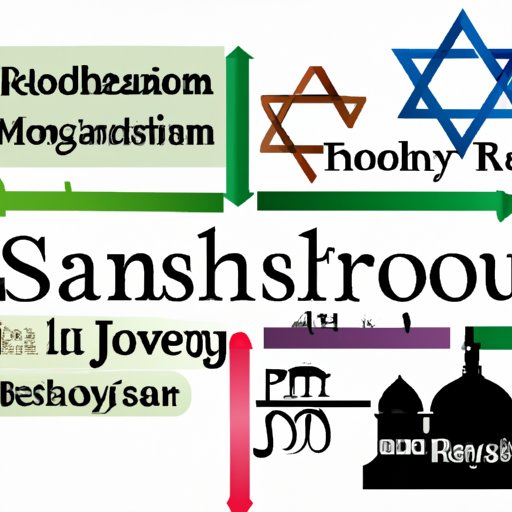Introduction
The question of whether Jewish is a culture or a religion has been debated for centuries. To understand the complexities of this issue, it is important to first define both terms. Jewish culture can be broadly defined as the shared beliefs, values, and norms that are passed down through generations within the Jewish community. Religion, on the other hand, refers to a set of spiritual beliefs and practices based on sacred texts and teachings.
In this article, we will explore the relationship between Jewish culture and religion. We will examine the historical context of Jewish culture, looking at how cultural practices have evolved over time. We will also analyze the intersection of Jewish identity and faith, considering the role of faith in Jewish life and the impact of cultural factors. Finally, we will investigate how Jewish culture influences modern believers, exploring the relevance of cultural practices in today’s world.
Examining the Relationship Between Jewish Culture and Religion
The relationship between Jewish culture and religion has long been a source of debate and discussion. For many, Jewish culture and religion are inseparable, with one informing the other. However, others argue that the two should be viewed as distinct entities.
Historical Context
Jewish culture has its roots in the Hebrew Bible, which is the foundational text of Judaism. In the Bible, God gives the people of Israel specific laws, customs, and rituals that they must follow. These laws and practices form the basis of Jewish culture, and they have been passed down through generations.
Cultural Practices in Judaism
Jewish culture includes a variety of practices and traditions. These include dietary laws, such as keeping kosher; holidays, such as Passover and Purim; and rituals, such as lighting Shabbat candles and reciting blessings before meals. There are also a number of cultural customs that Jews observe, such as wearing a kippah (head covering) or observing the Sabbath.
Significance of Religious Traditions
For many Jews, these religious traditions are an essential part of their identity. They view these customs and rituals as important expressions of their faith and a way to connect to their heritage. As Rabbi Lord Jonathan Sacks explains, “The core of Judaism is not about what we believe but about what we do. Our faith is expressed through practice, not just belief.”

A Look at Jewish Cultural Practices Throughout History
Jewish cultural practices have changed and evolved over time. Here we will look at some of the key developments in Jewish culture throughout history.
Ancient Customs and Rituals
In ancient times, Jewish culture was largely centered around religious observances and rituals. Many of these traditions have been preserved in modern times, such as the celebration of holidays like Passover and the practice of wearing a kippah.
Medieval Influences
During the medieval period, Jewish culture was shaped by the rise of rabbinic Judaism. This period saw a shift towards a more intellectual approach to Judaism, with a greater emphasis on the study of sacred texts. This led to the development of new religious practices, such as the study of the Talmud and the establishment of yeshivas (Jewish schools).
Contemporary Practices
Today, Jewish culture is still heavily influenced by religious observances and traditions. However, it has also been shaped by modern influences, such as secularism, globalization, and technological advances. As a result, there is now a greater diversity in Jewish culture, with Jews engaging in a range of cultural practices, from traditional religious rituals to more contemporary forms of expression.

Analyzing the Intersection of Jewish Identity and Faith
To fully understand the relationship between Jewish culture and religion, it is important to consider the meaning of Jewish identity and the role of faith in Jewish life.
Meaning of Jewish Identity
For many Jews, their identity is closely tied to their faith. As sociologist Steven M. Cohen explains, “Jewish identity is rooted in a commitment to Jewish tradition, and this commitment is a key component of Jewish self-identification.” This means that for many Jews, their identity is shaped not only by their cultural practices, but also by their religious beliefs and observances.
Role of Faith in Jewish Life
The role of faith in Jewish life is also significant. For many Jews, faith is an integral part of their identity and a source of meaning and purpose. As Rabbi Joseph Telushkin explains, “Judaism is more than just a religion; it is a way of life. It speaks to us about how we should conduct our lives, how we should treat each other, and how we should relate to God.”
Impact of Cultural Factors
It is also important to consider the impact of cultural factors on Jewish identity and faith. As anthropologist Shalom Goldman explains, “Jewishness is not simply a matter of faith or ancestry, but rather a complex mixture of cultural elements—language, customs, literature, music, and so on—that are shared by a particular group of people.” This means that culture plays an important role in shaping Jewish identity and beliefs.

Exploring the Role of Jewish Traditions in Contemporary Society
Jewish traditions continue to play an important role in contemporary society. Here we will look at some examples of Jewish customs and consider their social and political implications.
Examples of Jewish Customs
One example of a Jewish custom is the ritual of circumcision, which is practiced by many Jews as a sign of their covenant with God. Other common practices include the observance of the Sabbath and the celebration of religious holidays.
Social and Political Implications
These customs and traditions have had a profound impact on Jewish culture and identity. They have helped to shape the social and political landscape of the Jewish community and have contributed to the development of a distinct Jewish identity. For example, the observance of the Sabbath has served as a unifying force among Jews, creating a sense of solidarity and shared values.
Relevance of Cultural Practices
The relevance of these cultural practices in today’s world cannot be overstated. As author Naomi Schaefer Riley explains, “Jewish culture is an important part of the fabric of American life and should be celebrated and protected.” From the preservation of tradition to the promotion of social justice, Jewish cultural practices continue to have a positive influence on contemporary society.
Investigating How Jewish Culture Influences Modern Believers
Finally, it is important to consider how Jewish culture influences modern believers. Here we will look at how Jewish culture shapes theology and beliefs, rituals and holy days, and the preservation of tradition.
Theology and Beliefs
Jewish culture has had a profound influence on the development of Jewish theology and beliefs. From the interpretation of the Torah to the study of rabbinic texts, Jewish culture has shaped the way Jews think about and practice their faith.
Rituals and Holy Days
Jewish culture also shapes the way Jews observe religious rituals and holy days. From the celebration of Passover to the observance of the Sabbath, Jewish culture has helped to create a unique set of customs and traditions that are observed by modern believers.
Preservation of Tradition
Finally, Jewish culture has played an important role in the preservation of Jewish tradition. Through the practice of rituals and the celebration of holidays, Jews have kept alive the stories and values of their ancestors. This has helped to ensure the continuity of Jewish culture and identity.
Conclusion
In conclusion, it is clear that Jewish culture and religion are deeply intertwined. From ancient customs to contemporary practices, Jewish culture has had a profound impact on the development of Jewish theology and beliefs. It has also helped to shape the social and political landscape of the Jewish community and has contributed to the preservation of Jewish traditions. Ultimately, Jewish culture and religion are inextricably linked, and they play an essential role in the formation of Jewish identity.
(Note: Is this article not meeting your expectations? Do you have knowledge or insights to share? Unlock new opportunities and expand your reach by joining our authors team. Click Registration to join us and share your expertise with our readers.)
